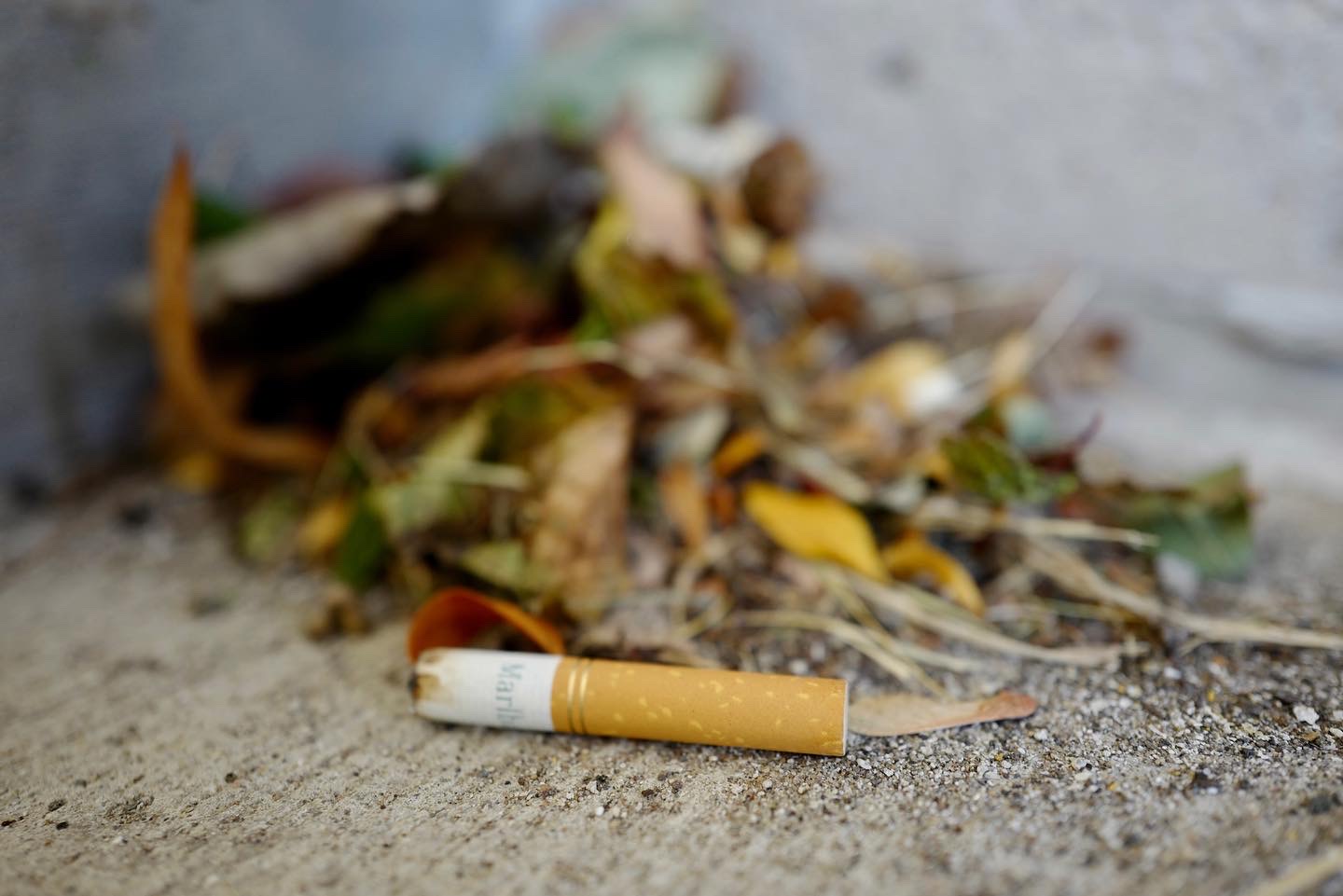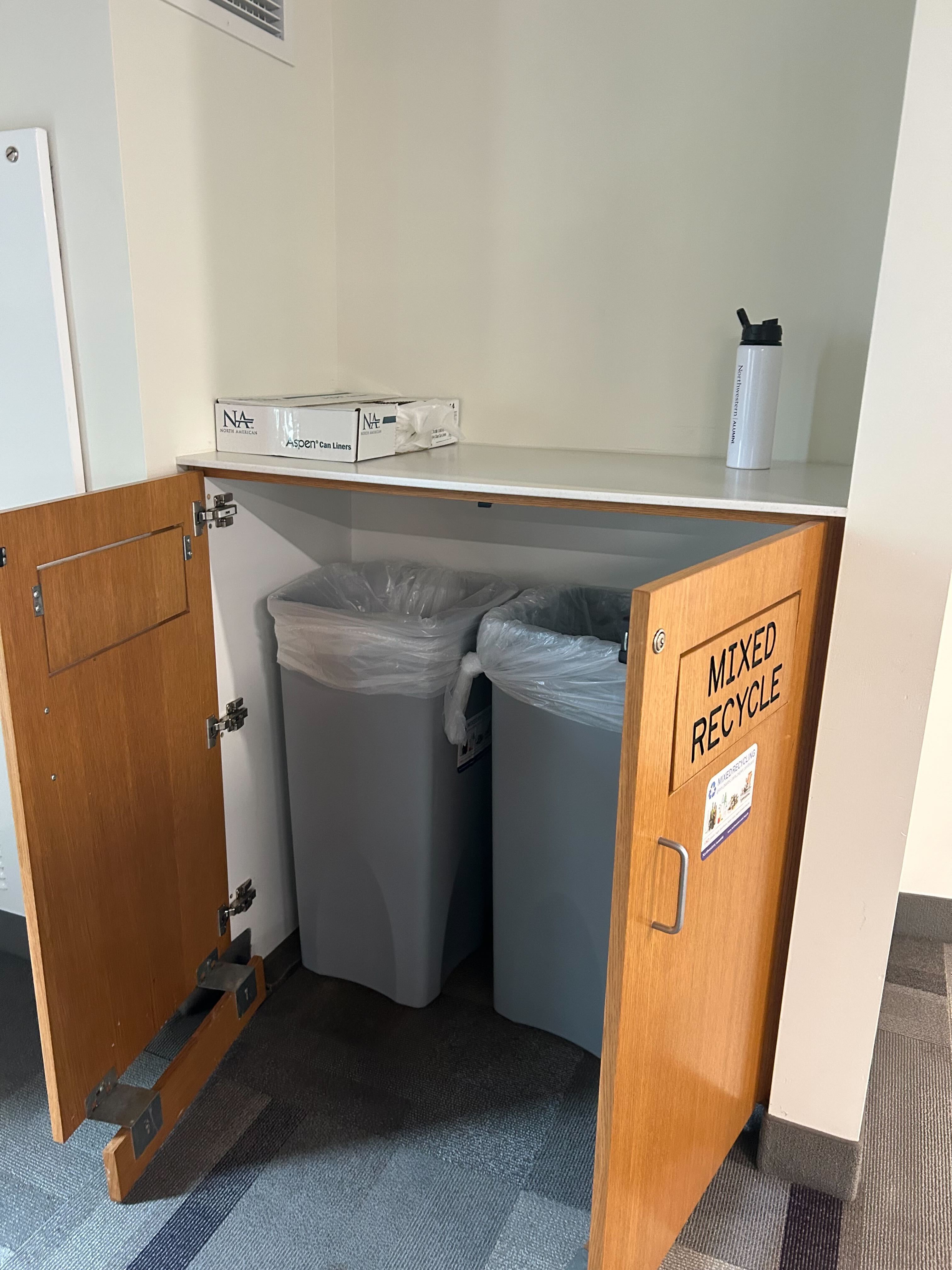
Weinberg fourth-year Natalie Myren was sitting by the door at “Generations of Environmental Justice,” an all-night Earth Day event in 2022, when she noticed a janitor hauling a trash bag past the room. She didn’t think anything of it until she realized the janitor was walking away from where she had just spent hours helping attendees sort their waste into trash, recycling and compost. Myren quickly went to check: clear trash bags lined all three bins.
“In that moment, I realized that the literal hours that Kelly and I had spent there, sorting the waste with attendees, was still important, but the tangible result of that effort was put to waste,” she said.
While Myren was the only witness to the sorted waste being combined that night, at least five students and two administrators have brought a similar concern to the Associated Student Government according to former president of the ASG Sustainability Committee (SusComm) Alexis Schwartz.
But not all waste on campus is combined when collected; a Northwestern sustainability report says the school either recycled or composted 39 percent of its waste in the 2021 fiscal year. STARS — a Sustainability Tracking, Assessment and Rating System that measures universities’ sustainability based on self-reported data — ranks Northwestern tenth of America’s top eleven schools.
According to STARS metrics, Northwestern scored lower in the category of waste management and diversion than the average for the top schools in the United States. Northwestern got 2.91 out of eight, falling below the 4.16 average for Northwestern, Cornell, Stanford, University of California Berkeley, Yale, MIT, Princeton, University of California Los Angeles, Notre Dame, Washington University and the University of Pennsylvania.
Starting in the 2023 Fall, the Norris University Center plans for 30 to 40 percent of its packaging to be compostable and to replace its trash and recycling bins with separate containers for landfill waste, mixed recycling and composting, according to Norris Executive Director Corbin Smyth.
“I came in with a plan because of what I saw where Northwestern is that we're on this cusp of really starting to make a difference,” Smyth said.
Myren attended the Earth Day event as a participant, but she represented the student group ’Cats Who Compost during meals, helping attendees sort their waste into trash, recycling and compost. “A lot of attendees wanted to engage in the sorting and learn something new,” Myren said.
’Cats Who Compost implemented free composting for students in 2020, but Northwestern’s dining halls and the Norris University Center restaurants have been composting since 2012. Northwestern began recycling in 1989.
Myren said she was frustrated when she saw that the well-sorted bins at the event had been combined. She explained to the custodian that she planned to bring the compost back to Hillel in the morning, but she was not allowed to retrieve the waste.
Associate Director of SustainNU Julie Cahillane said Northwestern teaches its janitorial staff to typically separate trash and recycling, but to combine the two in cases of significant contamination.
“Our custodians are one of our first lines of defense for contamination,” she said. “They're not going to throw away recycling if there's one candy wrapper in a recycling bin … but if it looks like trash, they're going to throw it out.”
While Myren said she didn’t blame staff for following policy, event attendees were upset that their sustainability efforts were trashed.
“When instances like this occur specifically at events where we're trying to educate attendees about waste, it feels incredibly ironic,” she said.
According to Schwartz’s knowledge, students don’t have faith in the University’s recycling practices. SusComm lacks the resources to launch an investigation into the issue, she added, but it plans to focus on educating workers and students about sorting waste.

Cahillane said it’s possible that facilities workers make mistakes, but it’s an “urban myth” that all waste goes into the same bin.
Northwestern switched to single-stream recycling in 2016, which means different recyclable materials like glass, plastic and cardboard are combined in one bin.
“I was hesitant to change to that just knowing that some of the things that we now have seen play out that things can be dirtier and people tend to get a little bit less careful about what they're putting them in because it seems like everything goes together,” Cahillane said.
She said Northwestern retrained its custodial staff and the campus community. The University also replaced bin labels to prepare for the switch.
The move to single-stream recycling coincided with an increase in waste diversion rates (with the 2011-15 average at 32.6 percent and the 2016-21 average at 39.3 percent according to Northwestern’s 2020-21 Sustainability Report), yet Northwestern’s progress still lags behind similar institutions.
“Maybe there is a problem and it’s something that we can address,” Cahillane said about concerns over waste mishandling. “I can only be in so many places, so the campus community is the eyes and ears for us.”
Cahillane said Northwestern’s implementation of OZZI carry-out dining containers, reduced number of copy machines and encouragement of reusable cutlery usage, among other measures, are intended to decrease the total amount of waste generated.
According to Smyth, Norris’s upcoming composting initiative is intended to divert more waste from landfills.
“I'm proud of where we'll be in the fall quarter, but it's not where we will just pat ourselves on the back for that,” Smyth said. “But it’s to continue to expand the program and again, we learn from hopefully little mistakes that we make and then improve the program and see where it can grow.”
Northwestern’s overall sustainability rating is 66.33 out of 100, according to STARS, with the average of the above-mentioned schools at 71.73. The University is also below average in 11 of the 18 categories comprising the overall score.
Smyth said everyone he talked to wants to do the right thing, but they don’t know how to do so.
“It's hard to do sustainable things,” Schwartz said. “We want to make sure that when you take that action you feel like you are making the difference.”